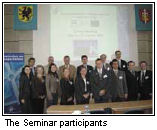Public Transport Seminar on Trolleybus
On 20 October the UBC Commission on Transportation
in cooperation with the CIVITAS TELLUS project organized
in Gdynia the Public Transport Seminar on Trolleybus Systems.
The place of the seminar was not accidental. Gdynia is an
active city and has gained about 100 million EUR of European
funds for significant infrastructure projects. It is also
one of the three cities in Poland that has a trolleybus
system. Moreover, it is the only one that is developing
it rapidly.
 Deputy
Mayor of Gdynia Marek Stepa and Chairman of UBC Commission
on Transport Lisa Sundell (City of Göteborg) opened
the Seminar. Deputy
Mayor of Gdynia Marek Stepa and Chairman of UBC Commission
on Transport Lisa Sundell (City of Göteborg) opened
the Seminar.
The first presentation was made by Marcel
Rommerts representing European Commission, DG TREN. He underlined
the role of clean and efficient public transport systems.
In fact almost 80% of EU citizens live in urban areas. For
better living conditions it is very important to secure
a very high quality of public transport systems that would
provide an alternative to individual car users. He gave
an example of Arnhem City where trolleybuses are part of
an attractive urban image.
Guido Bruggeman presented the areas of activity
of the EBRD. His analysis showed that there are 366 trolleybus
systems in Europe, mostly in the developing countries outside
the EU (ie. Russia, Ukraine, Romania). From his point of
view cities sometimes have too many urban transport systems
(ie. tramway, bus, trolleybus). This creates serious problems
in fulfilling all of the investment needs and in strengthening
competitiveness of the public transport system. Klas Sörensson
(Skonetrafiken) and Leila Nielsen (Arriva) presented the
process of building the first trolleybus system in Landskrona,
Sweden. Three trolleybuses of Solaris/Ganz operate the line
between the railway station and Landskrona city centre.
Bernt Nielsen, Director of Public Transport of Göteborg
titled his presentation as "Why did Göteborg not
introduce trolleybuses?" He said that the strategic
decision of the city was introducing CNG fuel into the public
transport. Main advantages of CNG are in his opinion lower
emissions than traditional diesel engines, lower investment
costs compared to the trolleybuses as well as the higher
flexibility of services.
The second part of the seminar contained
presentations of the cities that have a long experience
in developing and maintaining trolleybus systems.
|